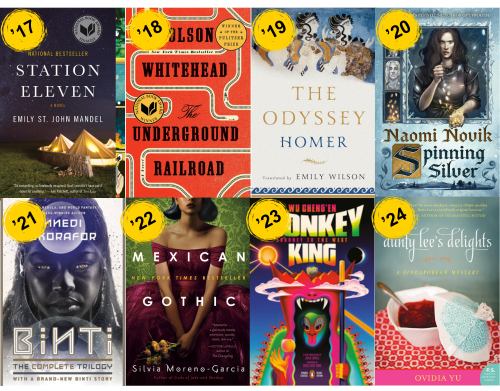
Past #PurdueEnglishBigRead Programs
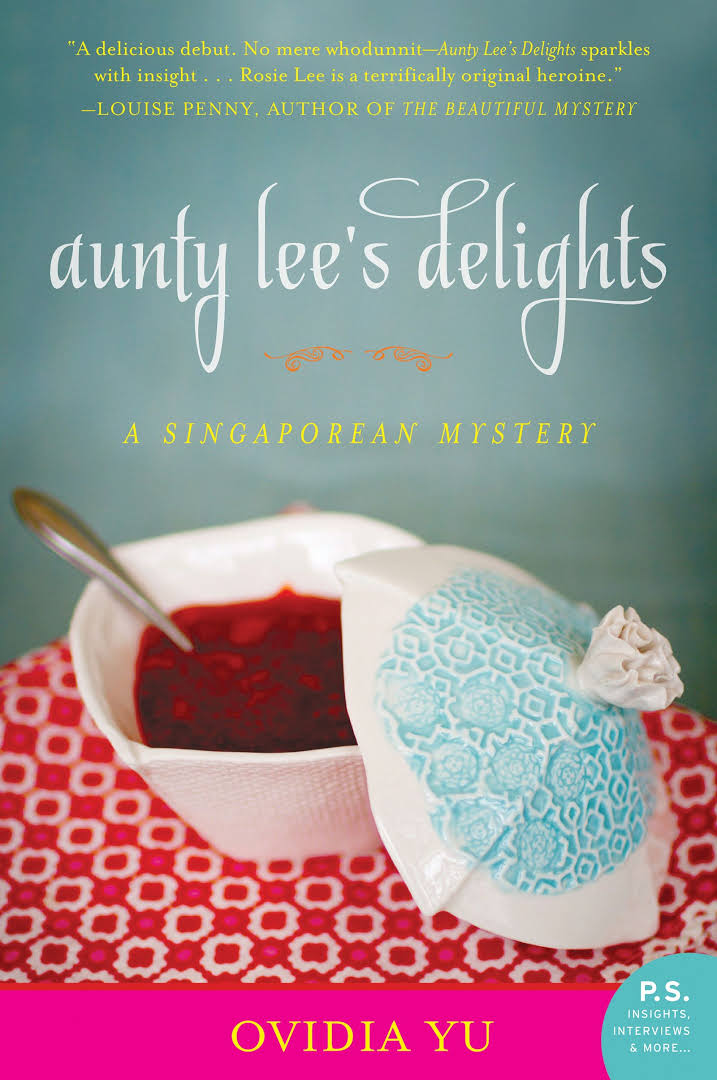
2024–25: Ovidia Yu's Aunty Lee's Delights: A Singaporean Mystery
Aunty Lee’s Delights is the first in a series of cozy mysteries set in modern-day Singapore, written by best-selling, internationally recognized author Ovidia Yu. This fun, accessible book follows "Aunty" Rosy Lee—a "kaypoh" (busybody) widow, restauranter, and amateur detective—who serves up mouth-watering home-cooking in her café while solving local crimes on the side.
When a tourist washes up dead on the beaches of Sentosa, one of the city’s hotspots, Aunty Lee is on the case, doling out bits of life advice as well as the secrets of her Peranakan cooking in equal measure. Ultimately, Yu’s novel tackles important themes such as family, aging, love, and tolerance while also providing a complex representation of the Southeast Asian island nation, where (as the book jacket tells us) "money flows freely and people of many religions and ethnicities co-exist peacefully, but where tensions lurk just below the surface."
The Purdue English Big Read Podcast
Our podcasts are available anywhere you get your podcasts.
-
“Singaporean Food Culture in Aunty Lee's Delights”: Featuring Sarah Jaran (School of Languages and Cultures) & Dr. Mindy Tan (School of Interdisciplinary Studies) and hosted by Emily Pearson (Dept. of English).
-
"Cozy Mysteries & Aunty Lee's Delights": Featuring Debora Borba & Matt Morgenstern (Dept of English) and hosted by Emily Pearson (Dept. of English).
Promotional Materials:
- 2024–2025 Big Read promotional fliers: 11×17; 8.5×11
- 2024–2025 Read alike catalogue
- 2024–2025 Big Read bookmark
In the News
- Akshita Nanda, “Ovidia Yu's fresh chance for fame at 52,” Asia One (8 Oct. 2013)
- James Kidd, “How author Ovidia Yu uses writing to explore injustice,” The National (24 July 2017)
- Melissa Gail Sing, "Artistic Voyages: Ovidia Yu," Tatler Asia (5 Dec. 2014)
Reviews
- "Aunty Lee’s Delights," Kirkus Reviews (29 July 2013)
- "Aunty Lee’s Delights," Publishers Weekly (8 July 2013)
- Carole E. Barrowman, "'The Tenth Witness;' 'Aunty Lee's Delights;' 'The Wrong Girl,'" Milwaukee Journal Sentinel (13 Sept. 2013)
- Beth Kanell, “Singapore Mystery: Aunty Lee's Delights, Ovidia Yu,” Kingdom Books (24 Nov. 2013)
- Sufyan, "To all the books we’ve read before: The ultimate list of bestseller books we loved in 2023," Honeycombers (29 Jan. 2024)
Interviews
- Lucy Burdette, "Aunty Lee's Delights," Jungle Red (24 Sept. 2013)
- Therese Marie Lim, “I Am Her: Author Ovidia Yu On The Power Of The Written Word,” The Beau Life (19 June 2020)
- “NAW Interview with Ovidia Yu,” New Asian Writing Community (6 Aug. 2014)
- “A Word With Ovidia Yu,” Dru’s Book Musings (4 Feb. 2023)
General
- Ovidia Yu’s website
- Ovidia Yu, "My KonMari Murder Method, by award-winning author Ovidia Yu," Female First (27 June 2019)
- Ovidia Yu, "Steamed Comfort Eggs from Ovidia Yu," Mystery Lovers’ Kitchen (26 Jan. 2014)
- Doreen Sheridan, "Cooking the Books: Aunty Lee’s Delights by Ovidia Yu," Criminal Element (1 June 2016)
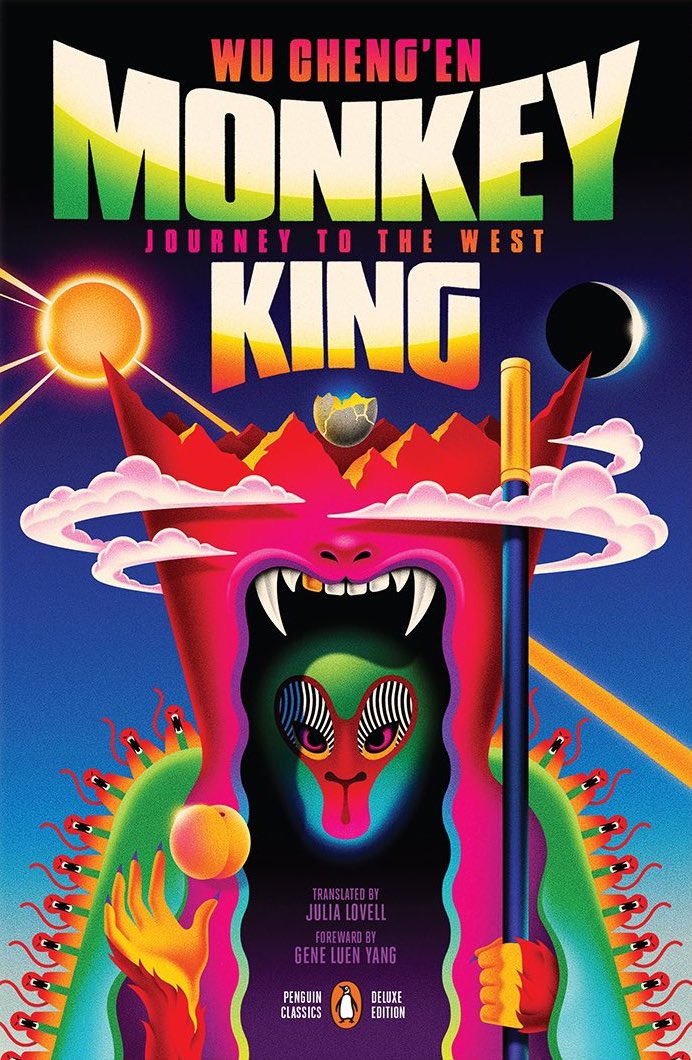
2023–24: Julia Lovell's Monkey King: Journey to the West
Shapeshifter, mischief-maker, and kung-fu master, the immortal Monkey King doles out punchlines and punches in equal measure. His life of simian shenanigans is interrupted, however, when the Buddha orders him to accompany the monk Tripitaka and a band of unlikely allies on a journey from China to India to find sacred sutras for the Tang Dynasty. Together, their trials narrate allegories of personal growth, spiritual awakening, and intercultural appreciation. In whirlwind fashion, Julia Lovell’s adaptation of Wu Cheng’en’s Journey to the West presents the classic Chinese epic as a fast-paced adventure, filled with humor and heart. It is sure to captivate readers of all ages.
Wu Cheng'en (c. 1505–1580), a Ming Dynasty novelist and poet, is believed to be the author of Journey to the West, which was published anonymously in 1592.
Julia Lovell (translator) is Professor of Modern Chinese History and Literature at Birkbeck College, University of London.
Virtual Events:
-
“Adapting Monkey King: American Born Chinese in Print & on Disney+”: Podcast with transcript, featuring Jianfen Chen (Dept. of English), Devan Lindey (Dept. of History), and Fiona Wang (Dept. of English) and hosted by Alex Anderson (Dept. of English). This podcast is also available on Spotify, Amazon Music, or as .m4a.
-
“Turning the Page: History of the Book and Publishing in Premodern China”:Lecture, Prof. Huiying Chen, Dept. of History
-
“Teaching Monkey King”:Podcast with transcript, featuring Benjamin Lathrop (Dept. of Education), ChenChen Lu (Dept. of Education), and Emily Pearson (Dept. of English) and hosted by Alex Anderson (Dept. of English). This podcast is also available on Spotify, Amazon Music, or as .mpa.
Promotional Materials:
- 2023–2024 Big Read promotional fliers: 11×17; 8.5×11
- 2023–2024 Read alike catalogue
- 2023–2024 Big Read bookmark
In the News:
- General:
-
Harman, Nicky, "Julia Lovell’s new translation of Monkey King: Journey to the West is a tour de force," Asian Books Blog (16 Feb. 2021)
- Heath, Will, "Why Monkey King is One of the Four Great Chinese Novels," Books & Bao (4 Feb. 2021)
-
- Interviews with Julia Lovell:
- Gordon, Nicholas, "Wu Cheng’en, ‘Monkey King: Journey to the West,’ trans. Julia Lovell (Penguin, 2021)," New Books Network: New Books in Literary Studies (11 Mar. 2021)
- Melvyn Bragg et al., "In Our Time: Journey to the West," BBC Sounds (20 May 2021)
- "Pieces of China (S3, E8): Julia Lovell on the Monkey King, 4.8.21," China Institute: Pieces of China (8 Apr. 2021).
- Reviews of Julia Lovell's Monkey King: Journey to the West:
-
Chen, Minjie, "A Chinese Classic Journeys to the West: Julia Lovell’s Translation of ‘Monkey King,'" Los Angeles Review of Books (LARB) (5 Oct. 2021)
-
Cheuk, Leland, "Review: New ‘Monkey King’ translation feels like the best Pixar adventures," Datebook (11 Feb. 2021)
-
Farmer, Alec, "Monkey King: Journey to the West (2021) – Translating a Chinese Classic for a Contemporary Audience," Asia Media International (20 Aug. 2021)
-
Van Fleet, John Darwin, "'Monkey King: Journey to the West’ by Wu Cheng’en, translated by Julia Lovell," Asian Review of Books (31 Jan. 2021)
-
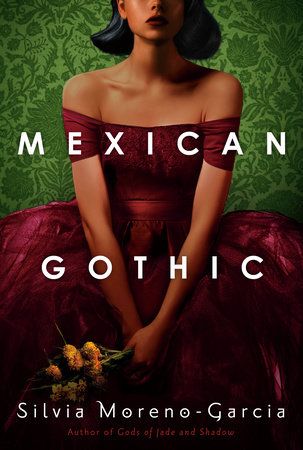
2022-2023: Silvia Moreno-Garcia's Mexican Gothic
The Purdue English Department’s 2022 Big Read selection is Silvia Moreno-Garcia’s Mexican Gothic. A New York Times bestseller, Mexican Gothic won the 2021 Locus Award for Best Horror Novel as well as the Goodreads Choice Award for Horror. It was also named one of the best books of 2020 by The New Yorker, Vanity Fair, NPR, Marie Claire, The Washington Post, Library Journal, and more. Now, it is being adapted into a Hulu miniseries.
Equal parts foreboding and thrilling, Mexican Gothic is a gothic romance, complete with enigmatic suitors and a haunting house, set in 1950s Mexico. A frightening, deranged message from her recently-married cousin, Catalina, sends Noemí Taboada to High Place, an English family estate built amidst silver-mine-pocked mountains on soil brought directly from England, and home to Virgil Doyle, Catalina’s alluring, British-Mexican husband. A socialite and aspiring anthropologist, Noemí puts her wits and charm to the test as she seeks to learn the cause of Catalina’s distress. What she gathers from conversations with townspeople, Doyle family members, and her own noticeably-disturbed cousin leaves Noemí—and readers—questioning who or what to believe. The stakes extend beyond Catalina’s personal safety to the fate of a former mining village and a whole region haunted by the colonial past and present.
Mexican Gothic has garnered praise for its captivating blend of feminist gothic tropes, Mexican history, and weird science. The Guardian describes it as “Lovecraft meets the Brontës in Latin America,” while NPR calls it an “inspired mash-up” of Jane Eyre, Dracula, and the “1958 classic sci-fi movie, The Blob.” Author of The Library of the Unwritten, A. J. Hackwith describes it as “an intense, beautiful monster of a novel.... Lush and lyrical writing makes this a vivid, seductive read.”
Virtual Events:
-
"5 Things to Know About Mexican Gothic”: Lecture, Dr. Jessica Mercado, Dept. of English
-
“Setting the Scene in Mexican Gothic: Society, Culture, and Politics of Early 20th-Century Mexico”: Lecture, Prof. Cara Kinnally, Dept. of Spanish and Portuguese
-
“Colonial Pasts, Postcolonial Presents”: Podcast (with transcript), featuring Débora M. Borba (Dept. of Spanish and Portuguese), Jehu Laniog (Dept. of Anthropology), Marybeth Perdomo (Dept. of English), and Alex Anderson (Dept. of English)
-
“Gothic Feminisms and the Female Gothic”: Podcast (with transcript), featuring Veronica Ahmed (Depts. of American Studies and Women's, Gender, and Sexuality Studies), Frankie Knuckles (Dept. of Philosophy), Narim Kim (Dept. of English), and Alex Anderson (Dept. of English)
Promotional Materials:
- 2022-2023 Big Read promotional fliers: 11×17 (Option 1); 11×17 (Option 2); 8.5×11
- 2022-2023 Read-alike catalog
- 2022-2023 Big Read bookmarks: Option 1; Option 2
In the News:
- Nick Schenkel, "Book Review: Mexican Gothic," WBAA public radio (17 June 2022)
- Silvia Moreno-Garcia's Blog
- Mexican Gothic Book Club Kit, Random House Books
- Silvia Moreno-Garcia, "Titan of Terror: The Dark Imagination of H.P. Lovecraft," Ted-Ed
Interviews with Silvia Moreno Garcia:
- Books Connect Us podcast, “Silvia Moreno-Garcia, author of MEXICAN GOTHIC,” Penguin Random House (24 Sep. 2020)
- Constance Grady, “Why white supremacy is a cult, according to novelist Silvia Moreno-Garcia,” Vox Book Club (6 Nov. 2020)
- Leah Donnella, “Colonialism, Eugenics, and Downright Terror in ‘Mexican Gothic,’” NPR, "Code Switch" (24 Sep. 2020)
- Dolores Quintana, “Decolonizing a Proto-Genre: Author Silvia Moreno-Garcia On MEXICAN GOTHIC,” Fangoria (15 June 2021)
- Jared Jackson, “The Pen Ten: An Interview With Silvia Moreno-Garcia,” Pen America (9 July 2020)
- “Latinx Horror: Interview with Silvia Moreno-Garcia,” Horror Writers Association (16 Oct. 2021)
Reviews of Moreno Garcia's Mexican Gothic:
- Jessica P. Wick, “Pitch-Perfect ‘Mexican Gothic’ Ratchets Up The Dread,” NPR (2 July 2020)
- Maureen Corrigan, “’Jane Eyre’ Meets ‘Dracula’ In This Sharp, Inventive ‘Mexican Gothic’ Tale,” NPR, “Fresh Air” (9 July 2020)
- Bethanne Patrick, “The twisted evil of eugenics made real in the novel ‘Mexican Gothic,’” Los Angeles Times (26 June 2020)
- Carol Memmott, “’Mexican Gothic’ is a creepy, intoxicating mystery that’s almost impossible to put down,” The Washington Post (30 June 2020)
- Greer Macallister, “A Twist of the Knife in ‘Mexican Gothic,’” Chicago Review of Books (10 Jul 2020)
- Ana Grilo and Thea James, “Book Review: Mexican Gothic By Silvia Moreno-Garcia,” The Book Smugglers (13 Feb. 2021)
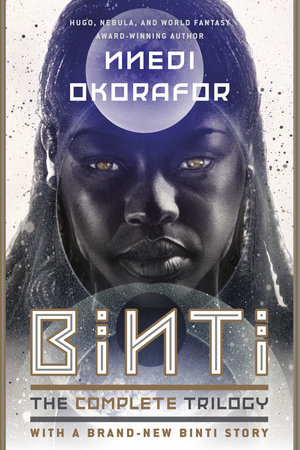
2021-2022: Nnedi Okorafor's Binti: The Complete Trilogy
Our 2021 Big Read selection was Nnedi Okorafor’s Binti: The Complete Trilogy. The collection includes a trio of novellas—Binti (2015), Binti: Home (2017), and Binti: The Night Masquerade (2018)—as well as a new short story. Binti won the Hugo, Nebula, and Nommo Awards for best science fiction novella.
Nnedi Okorafor is a bestselling, Nigerian-American writer who has quickly gained a reputation as one of the foremost voices in contemporary science fiction. The Binti series introduces us to a unique brand of “Africanfuturism,” Okorafor’s term for the deep investment in “African culture, history, mythology, and point-of-view” that pervades her fiction. Set on earth and in space, the Binti trilogy tells the story of a young woman from Namibia who negotiates the stress of leaving home and heading off to college, confronting past tradition and future prospects as she struggles to find her place in an alien environment. Relying on her love of mathematics and also newfound friendships, Binti must negotiate prejudice, self-doubt, and trauma as the narrative builds to high-stakes conflicts between groups on Earth and beyond.
Okorafor’s stories have been praised by critics. Neil Gaiman, for instance, writes, “Nnedi Okorafor writes glorious futures….Her worlds open your mind to new things, always rooted in the red clay of reality. Prepare to fall in love with Binti.”
Virtual Events:
-
"5 Things to Know about Africanfuturism": Lecture, Prof. Marlo David, English & Women's Gender, and Sexuality Studies
-
“Marginalized Voices in Binti and Beyond": Podcast (with transcript), hosted by Juanita Crider (Ph.D. student, Purdue Black Cultural Center and American Studies), Erika Gotfredson (Ph.D. student, English), and Malik Raymond (Ph.D. student, American Studies)
-
“Space, Place, & Community in Binti”: Podcast (with transcript), hosted by Erika Gotfredson, Alex Anderson, and Ane Costa (Ph.D. students in English)
Promotional Materials:
- 2021-2022 Big Read promotional fliers: 11×17; 8.5×11
- 2021-2022 Read-alike catalog
- 2021-2022 Big Read bookmarks: Option 1; Option 2
- #PurdueBigRead:
- Nick Schenkel, "Book Review: Binti: The Complete Trilogy," WBAA public radio (17 September 2021)
- Christy McCarter, “Big Read program goes virtual, brings ‘Spinning Silver’ to local readers,” Purdue Today (11 Sept. 2020)
- Fayth Schutter, “Online Accessibility and the 2020 Big Read’s Transition to a Virtual Platform,” Imagination over Automation (9 Nov. 2020)
- General:
- Nnedi Okorafor, “Sci-fi stories that imagine a future Africa,” TED Talk (Aug. 2017)
- Nnedi Okorafor, “Africanfuturism Defined,” Nnedi’s Wahala Zone Blog (19 Oct. 2019)
- Hope Wabuke, “Afrofuturism, Africanfuturism, and the Language of Black Speculative Literature,” Los Angeles Review of Books (27 Aug. 2020)
- Eliza Anyangwe, “‘So many different types of strange’: how Nnedi Okorafor is changing the face of sci-fi,” The Guardian (18 Sept. 2017)
- Interviews with Nnedi Okorafor:
- Tom Hawking, “Flavorwire Interview: Nnedi Okorafor on ‘Binti: Home,’ Dislocation, and One Very Important Jellyfish,” Flavorwire (29 Mar. 2017)
- WIRED Staff, “WIRED Book Club: Nnedi Okorafor Finds Inspiration Everywhere—Including Jellyfish,” WIRED (1 Feb. 2017)
- Andrew Liptak, “Sci-fi author Nnedi Okorafor on creating an interstellar coming-of-age story,” The Verge (25 May 2017)
- Christian A. Coleman, “Interview: Nnedi Okorafor,” Lightspeed Magazine (Mar. 2017)
- Farai Chideya, “Hugo Nominee Nnedi Okorafor: ‘I Love Stories – And so I Write Them,’” NPR, “All Things Considered” (20 Aug. 2016)
- Reviews of Okorafor’s Binti Trilogy
- Amal El-Mohtar, “A Spacefarer’s Next Great Adventure Begins At ‘Home,'” NPR (4 Feb 2017)
Ana Grilo, “An Interstellar Identity,” Kirkus (2 Oct. 2015)
Andrew Liptak, “The Binti novellas are fun, bite-sized stories of interstellar Afrofuturism,” The Verge (25 Jan. 2017)
Liz Bourke, “Liz Bourke Reviews Binti: The Night Masquerade by Nnedi Okorafor,” Locus (10 Feb. 2018)
C. (Guest Blogger), “'Binti' is Not to be Missed by Any Afrofuturism Fan,” Black Girl Nerds
- Amal El-Mohtar, “A Spacefarer’s Next Great Adventure Begins At ‘Home,'” NPR (4 Feb 2017)
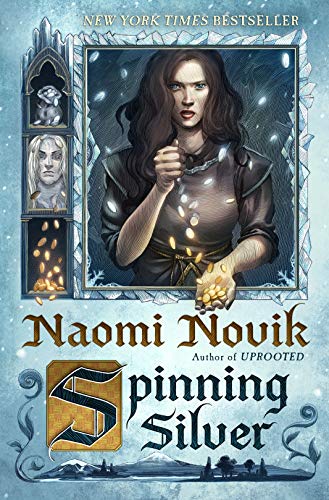
2020-2021: Naomi Novik’s Spinning Silver
The 2020 Big Read selection was Naomi Novik’s Spinning Silver (2018), which won the 2019 Locus and Mythopoeic Awards for Best Fantasy Novel and was a finalist for the 2019 Hugo and Nebula Awards for Best Novel.
Naomi Novik is the NYT bestselling and fantasy award winning author of the historical fantasy Temeraire series as well as Uprooted and, of course, Spinning Silver. It’s a fantasy novel that re-envisions the fairy tale, “Rumpelstiltskin,” interweaving it with Jewish, Russian, and Eastern European folklore influences. The novel tackles topics ranging from fractured fairy tales (feminist retellings), to the Jewish diaspora and the suffocating legacies of antisemitism, the ravages of poverty, coming-of-age, romance, and more. But it’s wrapped in engrossing fantasy world building that makes the book an easy sell with readers.
Virtual Events:
- “5 Things to Know about (Russian/Slavic) Fairy Tales”: Recorded video lecture, Dr. Olga Lyanda-Geller, School of Languages & Cultures, Purdue University
- Wabash Lifetime Learning Association panel discussion: Recorded video, Kristine Anderson, Ron Andres, Nancy Hartman, Margaret Rowe, and Sally Gustafson (moderator).
- “Spinning Silver: From Short Story to Novel”: Podcast (with transcript), hosted by Erika Gotfredson, Narim Kim, and Vanessa Iacocca, Ph.D. students in English Literature at Purdue
- “Spinning Trust between Jews & their Neighbors in the Heart of the Diaspora”: Recorded video lecture (with slides), Dr. Rebekah Klein-Pejsova, Department of History, Purdue University
- “Language as Magic in Spinning Silver”: Podcast (with transcript), hosted by Erika Gotfredson, Emily Pearson, and Jason Abad, Ph.D. students in English Literature at Purdue
- “Writing Fairy Tales”: Tutorial videos, hosted by the Purdue Online Writing Lab
Promotional Materials:
- 2020-2021 Big Read promotional fliers: 11×17; 8.5×11; 8.5×11 (alternate)
- 2020-2021 Read-alike catalog
- 2020-2021 Big Read bookmark
- 2020-2021 Big Read crossword
Bite-Sized Read-alike Reviews:
- Mortal Sight (Professor Angelica Duran, Dept. of English, Purdue University) and Mortal Sight book trailer.
- Baba Yaga’s Assistant (Ashley Schoolman, Reference & Teen Librarian, WLPL)
In the News:
- #PurdueBigRead:
- Laura Kendall, “Letter: Thanks to Purdue and Greater Lafayette for the Big Read,” Journal and Courier (18. Dec. 2019)
- Kelsey Schnieders Lefever, “Spinning Silver, a retelling of ‘Rumpelstiltskin,’ to be featured Big Read book,” Purdue Today (20 April 2020)
- Interviews with Naomi Novik:
- Frannie Jackson, “Naomi Novik Talks Spinning Silver, Her Rumpelstiltskin-Inspired Novel,” Paste Magazine (10 July 2018)
- Martha Greengrass, “The Interview: Naomi Novik on Spinning Silver,” Waterstones Blog (1 Aug. 2018)
- Olivia Ho, “Fantasy author Naomi Novik on dragons, fairytales and fans taking over her stories,” Straits Times (13 Aug. 2018)
- Reviews of Novik’s Spinning Silver:
- Constance Grady, “With Spinning Silver, Naomi Novik cements her status as one of the great YA fantasy authors,” Vox (20 July 2018)
- Amal El-Mothar, “Silver Spins Gold From The Moldiest Of Old Straw,” NPR (17 July 2018)
- Mahvesh Murad, “Unweaving a Fairy Tale: Spinning Silver by Naomi Novik,” TOR.com (10 July 2018)
- Michael Robbins, “Literary fiction or genre? When Megan Abbott and Naomi Novik are writing, who cares,” Chicago Tribune (17 July 2018)
- Choire Sicha, “Rumpelstiltskin Redux,” New York Times Book Review (3 Aug. 2018)
- “Spinning Silver,” Kirkus Reviews (1 May 2018)
- Starred review, “Spinning Silver,“ Publishers Weekly (23 April 2018)
- Gary K. Wolfe, “Gary G. Wolfe Review Spinning Silver by Naomi Novik,” Locus (4 Sept. 2018)
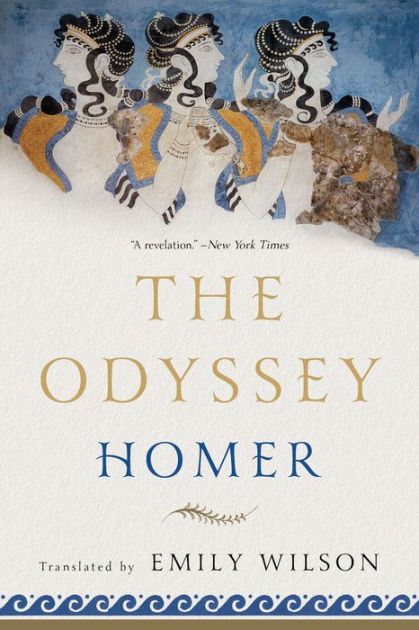
2019-2020: Emily Wilson’s translation of The Odyssey
Our third annual Big Read (2019-2020) was Emily Wilson’s splendid translation of The Odyssey.
In this, the first English translation of The Odyssey by a woman, Emily Wilson relays what has been described as “the first great adventure story in the Western canon.” Homer’s The Odyssey is a poem that explores the ramifications of war and violence, the intricacies of marriage and family, and the magnetism of wealth and power through one hero’s journey and subsequent search for home. Wilson’s translation, which matches the number of lines in the Greek original, conveys this stirring tale of shipwrecks, monsters, and magic in iambic pentameter verse while proving accessible for contemporary audiences.
Resources:
- 2019-2020 Big Read promotional fliers: 11×17 and 8.5×11
- 2019-2020 Big Read bookmark
- 2019-2020 Big Read Alike Catalog
In the News:
- #PurdueBigRead:
- David Ching, “English Department’s ‘Big Read’ project set to tackle ‘The Odyssey,‘” THiNK Magazine (Spring 2019)
- Lori Ferguson, “The Power of Fiction,” Alumnus (Winter 2019): 12-14.
- Interviews with Emily Wilson:
- Amy Brady, “How Emily Wilson Translated ‘The Odyssey,’” Chicago Review of Books (16 Jan. 2018)
- Angel Cruz, “Interview with Emily Wilson on Her New Translation of the Odyssey,” BookRiot (4 Dec. 2017)
- Fran Wilde, “The Voices of The Odyssey: Emily Wilson On Language, Translation, and Culture,” TOR.com (3 May 2018)
- Wyatt Mason, “The First Woman to Translate ‘The Odyssey’ into English,” NY Times (2 Nov. 2017)
- Reviews of Emily Wilson’s Odyssey translation:
- Richard H. Armstong, “Homer for Scalawags: Emily Wilson’s ‘Odyssey,’” Los Angeles Review of Books (5 Aug. 2018)
- Xiaxun Ding, “Statement: A New Odyssey for the Ages,” Humanities: The Magazine of the National Endowment for the Humanities (Winter 2019)
- Rebecca Newberger Golstein, “The Odyssey and the Other,” The Atlantic (Dec. 2017)
- Gregory Hays, “A Version of Homer that Dares to Match Him Line for Line,” New York Times (5 Dec. 2017)
- Charlotte Higgins, “The Odyssey Translated by Emily Wilson Review – A New Cultural Landmark,” The Guardian (8 Dec. 2017)
- Anndee Hochman, “Emily Wilson’s New Translation of Homer’s ‘The Odyssey’: Odysseus Returns,” BroadStreetReview.com (7 Aug. 2018)
- Anna North, “Historically, Men Translated the Odyssey. Here’s What Happened When a Woman Took the Job,” Vox (20 Nov. 2017)
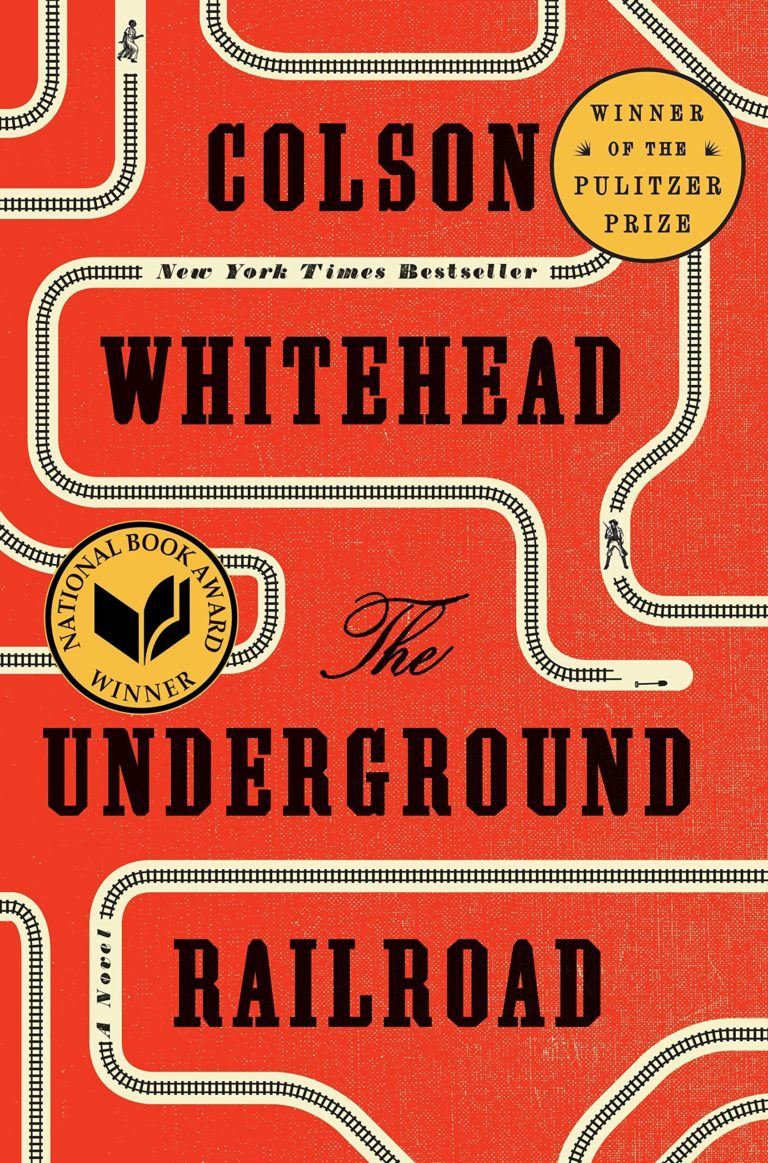
2018-2019: Colson Whitehead’s The Underground Railroad
The English Department at Purdue presented its second annual Big Read, featuring Colson Whitehead’s The Underground Railroad. Colson Whitehead was also the guest speaker for our 2019 Literary Awards Banquet.
In Whitehead’s ingenious conception, the Underground Railroad is no mere metaphor—engineers and conductors operate a secret network of tracks and tunnels beneath the Southern soil. Cora and Caesar’s first stop is South Carolina, in a city that initially seems like a haven. But the city’s placid surface masks an insidious scheme designed for its black denizens. And even worse: Ridgeway, the relentless slave catcher, is close on their heels. Forced to flee again, Cora embarks on a harrowing flight, state by state, seeking true freedom. Like the protagonist of Gulliver’s Travels, Cora encounters different worlds at each stage of her journey—hers is an odyssey through time as well as space. A genre-bending blend of historical narrative, science fiction, and adventure, The Underground Railroad is at once a kinetic tale of one woman’s ferocious will to escape the horrors of bondage and a shattering, powerful meditation on the history we all share.
Special thanks to our 2018-2019 partners: Barnes & Noble Bookstores; Information Technology at Purdue & “Dawn or Doom”; Harrison High School; McCutcheon High School; Penguin Random House Speaker’s Bureau; Purdue Honors College; Purdue Office of Residential Life; Purdue Student Union Board; Purdue University Libraries; Tippecanoe County Public Libraries; Tippecanoe County Historical Association; Von’s Shops; Wabash Lifetime Learning Association; West Lafayette Public Library.
Resources:
- Underground Railroad reader’s guide
- 2018-2019 Big Read promotional flyer
- 2018-2019 Big Read bookmark
In the News:
- Alisa Reyna, “68th Annual Books and Coffee Kicks Off with Next Year’s ‘Big Read’ Novel,” The Exponent (2 Feb. 2018)
- Natalie Fedor, “Eugenics and Indiana’s History Feature in Book Discussion,” The Exponent (8 Nov. 2018)
- David Ching, “Pulitzer Prize-winning author to appear at Purdue Literary Awards, give public reading,” Purdue University News (9 Apr. 2019)
- Amanda Leary, “Book Review: ‘The Underground Railroad’ by Colson Whitehead,” Purdue Department of English Blog (8 May 2019)
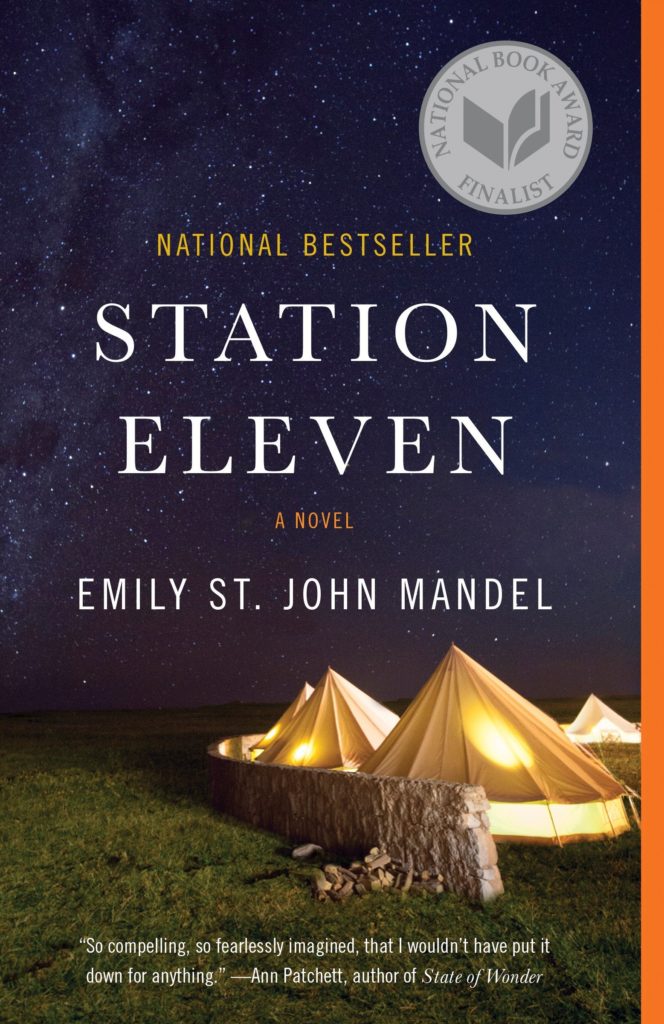
2017-2018: Emily St. John Mandel’s Station Eleven
“Because survival is insufficient.” Now, when support for the humanities is more important than ever, this motto (from Station Eleven by way of Star Trek) seems appropriate in and out of the world Mandel has created.
Station Eleven was the ideal choice for our inaugural “Big Read.” The work is critically acclaimed: it was a National Book Award and PEN/Faulkner Award finalist in 2014 and an Arthur C. Clarke Award and Toronto Book Award winner in 2015. Although readily classified as science fiction, the book also invites discussion and collaboration with readers of many other genres and interests. The book’s representation of the killer “Georgia flu” lends itself well to discussions by writers and epidemiologists alike, bringing faculty and attendees together in interdisciplinary conversation. The persistence of Shakespeare after the apocalypse triggers questions about great art and an enduring canon of literature, and the book’s traveling troupe of actors could profitably be compared to Elizabethan troupes performing in Shakespeare’s own day, or even contemporary itinerant players, such as the Stone Soup Shakespeare Company, which tours much the same route covered by the players in Station Eleven, our own Midwestern parks and towns.
Resources:
- Station Eleven reader’s guide
In the News:
- Courtney Dobrzykowski, “‘Big Read’ Bodes Big Changes for English Department,” The Exponent (17 Aug. 2017)
- Nick Schenkel, “Book Review: Station Eleven,” WBAA (20 Oct. 2017)
- Alisa Reynya, “‘Big Read’ Novel Questions Who We Are As Humans,” The Exponent (16 Feb. 2018)
- John Clare, “WBAA Arts Spotlight: Big Read ‘Station Eleven,’” WBAA (4 Apr. 2018)